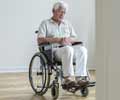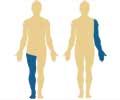New research led by the University of Adelaide reveals that cesarean deliveries do not prevent children from developing cerebral palsy.

The findings, to be published in the December issue of the journal Obstetrics & Gynecology, show that the risk of cerebral palsy is not lowered by either elective cesarean delivery before labor or emergency cesarean delivery during labor.
"For over a century it was assumed, without good evidence, that most cases of cerebral palsy were due to low oxygen levels or trauma at birth," says research leader Emeritus Professor Alastair MacLennan from the University of Adelaide's Robinson Institute.
"The simple facts are that over the last 40 years, cesarean rates have increased more than six-fold from 5% to 33% in Australia and in many other countries. However, the incidence of cerebral palsy has remained at 2-2.5 per 1000 births," he says.
Lead author and Affiliate Lecturer Dr Michael O'Callaghan says: "This systematic review of the literature clearly shows that the causes of cerebral palsy have little to do with mode of delivery. Therefore, the actual causes of cerebral palsy must lie elsewhere."
The Australian Collaborative Cerebral Palsy Research Group is investigating the probable genetic origins of cerebral palsy.
"We now need to focus our efforts on finding the antenatal causes of cerebral palsy and their prevention." These may include genetic vulnerability and environmental triggers, such as infection.
Source-Eurekalert
 MEDINDIA
MEDINDIA




 Email
Email







